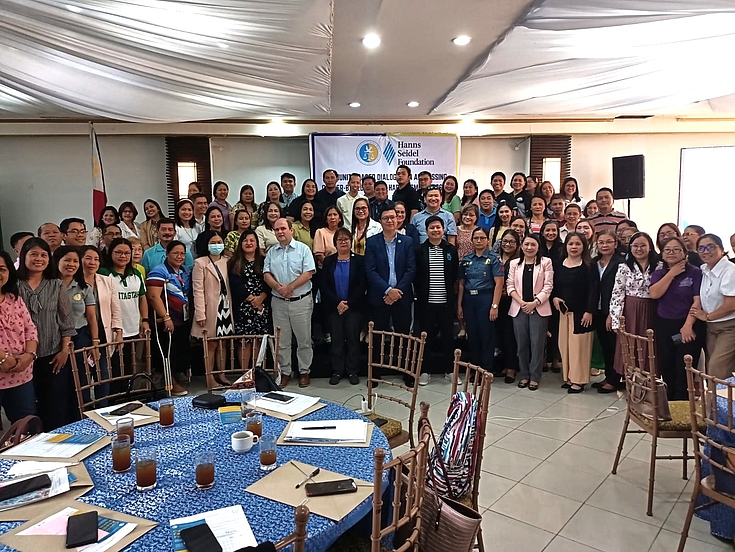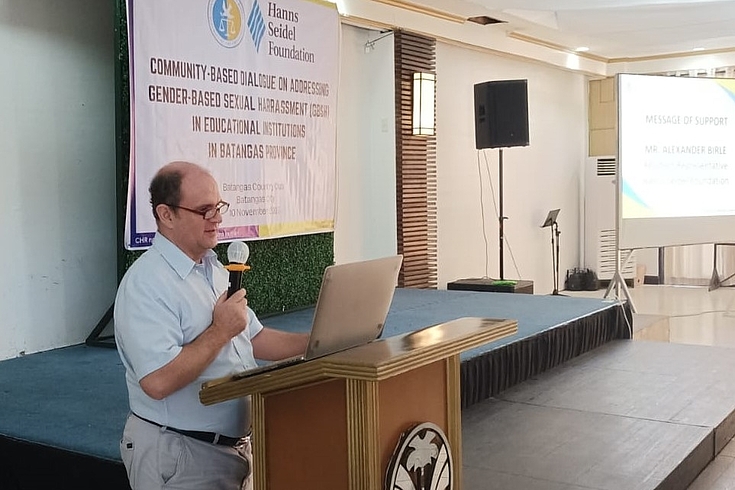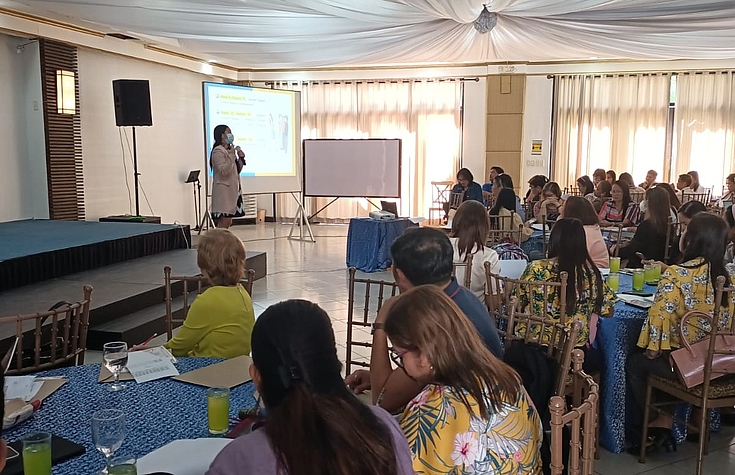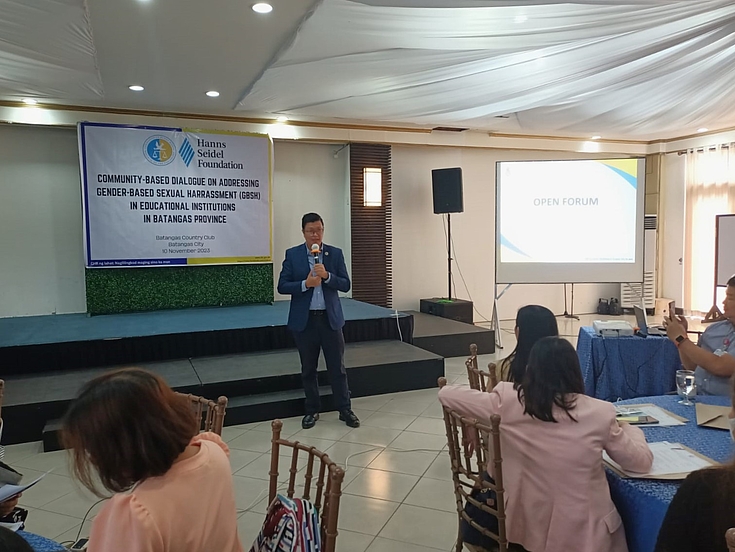Community-based Dialogues Project (CBD)
CBD on Addressing Gender-Based Sexual Harassment in Educational Institutions in Batangas Province
Group photo
HSF
It was attended by more than 80 participants representing school heads and Gender and Development (GAD) focal persons of selected State Universities and Colleges (SUC), Elementary and High Schools, public or private within Batangas Province; representatives of the Commission on Higher Education (CHED) Regional Office IV-A, Department of Education Region IV-A (DepEd IV-A) and Technical Education and Skills Development Authority IV-(TESDA) Provincial Office; Philippine National Police (PNP) Provincial Human Rights Desk Office; civil society organizations (CSOs); local government units (LGUs) specifically City and Municipal Councilors acting as Chairperson on Committee on Human Rights of Batangas Province; officers and staff from CHR Region IV-A led by its Regional Director, Atty. Rexford Guevarra, and HSF led by its Resident Representative, Mr. Alexander Birle.
The objectives were to: (i) allow the CHR to obtain accurate data and statistics on gender-based sexual harassment (GBSH) in academic institutions across the region particularly from representatives of academic institutions, including from Centers for Human Rights Education (CHRE) partners, and (ii) identify gaps and challenges in the implementation of the Safe Spaces Act (RA 11313), surface unique experiences that schools encounter when handling GBSH, and encourage them to share best practices in investigating and resolving GBSH.
The Opening Remarks was given by Atty. R. Guevarra who acknowledged the invaluable contributions of the participants and partner organizations to the development of the country particularly in the pursuit of human rights promotion and protection. He mentioned that the Philippines is the 109th country to sign and ratify the UN Convention on the Rights of the Child. He noted the importance of the Safe Spaces Act enacted in 2019 which expanded the coverage of the law to public spaces and digital technology (online), specifically Article 5 that provides the specific duties that schools and training institutions must abide when gender-based sexual harassment (GBSH) happens in their premises. He commended the enactment of RA 11313 and other relevant laws for the protection of children. He added it is important to bring together relevant stakeholders for this activity to hear from each other’s thoughts, ideas and experiences in order to enlighten the CHR on what really is happening in the community of educational institutions and how else can the Commission contribute to the protection and promotion of the human rights of children. He expressed his gratitude to HSF for its continuous support to CHR Region IV-A in the conduct of CBDs.
Mr. Alexander Birle, Resident Representative of HSF Philippines, delivers his message.
HSF
HSF Resident Representative, Mr. Alexander Birle shared a brief Message. He warmly acknowledged the presence of the participants and the Commission on Human Rights Region IV-A and also expressed his appreciation for being able to attend the CBD. He acknowledged the longstanding partnership between HSF and CHR to contribute to the improvement of the human rights situation in the country covering civil, political, economic, social and cultural rights. He noted that the conduct of the CBD on gender-based sexual harassment is timely to highlight the protection of the rights of children in educational and training institution and the promotion of gender equality.
Atty. Diana Gamo, Legal Division, CHR Region IV-A gave an “Overview of the Safe Spaces Act with emphasis on Article V.” Highlights of her presentation are as follows: (i) The Committee on Decorum and Investigation (CODI) of all educational institutions shall address gender-based sexual harassment and online sexual harassment in accordance with the rules and procedures contained in their CODI manual; (ii) duties of school heads-e.g. create CODI; (iii) liabilities of school heads-e.g., penalties; (iv) penalties (1st to 3rd degree)-community service with gender sensitivity seminar, imprisonment, fine; and prescriptive periods-online GBSH is imprescriptible, and 5 years for GBSH committed in the workplace and educational and training institutions.
Resource persons from the PNP, DepEd and TESDA of Batangas Province presented data, statistics and information on GBSH cases/incidents reported to their respective offices as well as regional guidelines on the protection of children (DepEd).
The PNP representative shared that there are 4 cases (2 minors, 2 adults, 3 offenders are teachers) of GBSH reported to their office from January to November 8, 2023 and that these were all filed in court.
Atty. Jocelyn Guzman, Legal Unit Head of DepEd Region IV-A, DepEd Region IV-A presented “Framework for Children’s Rights.” Highlights are as follows: (i) DepEd issuances relating to child protection-DepEd Order No. 40 s. 2012-Creation and Functions of Child Protection Committee (CPC), Introduction of Positive and Non-violent discipline, Declaration of Prohibited Acts, Investigation and reporting for public and private schools, referral and assessment, Function of the Regional Office; DepEd Order No. 55 s. 2013-CPC as Anti-Bullying Committee, Procedures in handling Bullying incidents, Under the disciplinary measures, Function of the Regional Office; Regional Memorandum (RM)-Regional Child Protection Policy and Anti-Bullying Manual of DepEd CALABARZON for Public Schools-Code of Conduct for DepEd officials, personnel, parents and visitors, detailing prohibited acts; RM-21-2017-Express System of Reporting and Intervention; and RM 217 s. 2021-Guidelines on Express System of Reporting and Intervention; (ii) Committee on Student Discipline-composition, functions; (iii) Offenses in schools-gravity of offenses and kinds; (iv) Due process; (v) Positive discipline and restorative justice principle; (vi) Intervention programs; and (vii) Ways forward-for school heads to convene child protection committee and refer this regional guidelines, decide if regional guidelines will be adopted as child protection police, discuss regional guidelines to parents and teachers associations, implement regional guidelines as school manual/handbook. She reported the following findings: (i) number of cases involving violation of child protection (bullying, child abuse) is decreasing (2017-50%, 2020-35.66%); (ii) males are more prone to GSBH; (iii) public schools have more cases of GBSH than private schools
TESDA representative, Mr. John Loyd Gambalan, TESD Specialist II, TESDA Batangas Provincial Office shared that its office has not received any formal complaint on GBSH but had experiences related to unjust vexation. He added that TESDA has a GAD officer, CODI and CCTVs in campus. He noted that there are more male-students than female-students in TESDA.
Ms. Aileen Edades, Division Chief, Promotion and Advocacy Division, CHR Region IV-A, CHR Region IV-A gave an “Orientation on CHRE (Centers for Human Rights Education) in the Philippines.” She stated the official definition by UN on human rights education/HRE (everyone has a right to education) which includes the different elements and provisions on HRE in the core international treaties and declarations, as well as the rationale for HRE Centers based on domestic and international legal mandates and commitments. She named existing HRE Centers in educational institutions in Region IV-A and possible partnerships with other universities/colleges in the region. She underscored the objectives viz, to i) create a high level of awareness on human rights among university extension programs, ii) develop a critical mass of committed human rights educators, and iii) to contribute to the realization of the human rights of vulnerable sectors of Philippine Society. She mentioned the partners-Commission on Higher Education (CHED), Philippine Council of Human Rights Educators and Philippine Association of Extension Program Implementors, and the services/activities of CHREs to the public human rights education such as support to human rights legislative and other measures for the promotion and protection of human rights of vulnerable sector, and human rights information dissemination.
HSF
During the Open Forum, the following comments, insights and experiences were shared: i) it is possible to file 2 criminal cases simultaneously, ii) complainant/victim can seek CHR assistance in filing case, iii) important to provide documentation/evidence/testimony of victim, iv) conflict between local ordinance and school policy e.g., cross-dressing of students/LGBQT), v) follow the law despite contradictions with organizational policies, vi) respect underlying principles of inclusivity and non-discrimination, vii) GBSH committed between minor to minor, teacher to teacher, child to teacher & teacher to child, viii) shortage of mental health practitioners, ix) tap LGUs for outsourcing of mental health practitioners, and x) conduct of dialogue with LGUs to discuss issues and concerns.
Atty. R. Guevarra led the Presentation of Awards to resource persons and partner organizations. In closing, he thanked the active participation of the participants toward the successful conduct of the CBD that was well attended. He also expressed his gratitude to HSF for its continued support to CHR Region IV-A in the conduct of CBDs in the region. A group photo was taken for documentation purposes.




